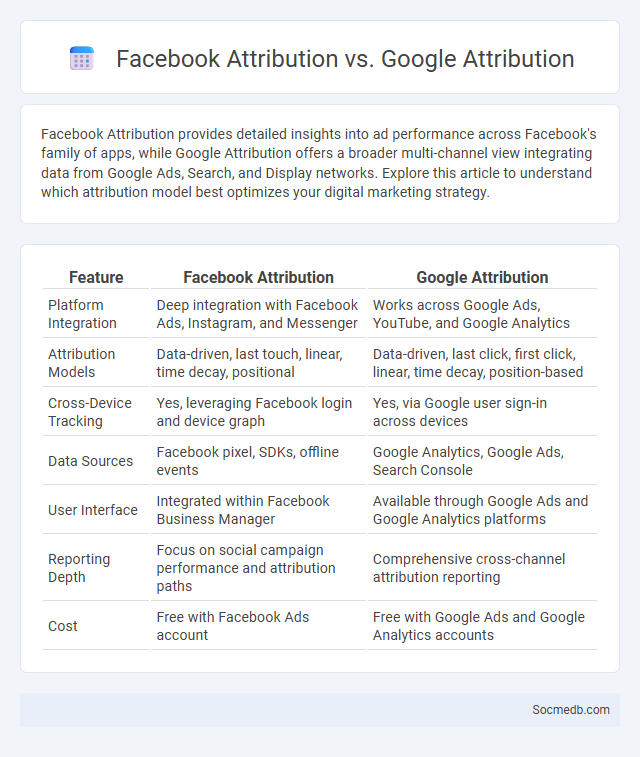
Photo illustration: Facebook Attribution vs Google Attribution
Facebook Attribution provides detailed insights into ad performance across Facebook's family of apps, while Google Attribution offers a broader multi-channel view integrating data from Google Ads, Search, and Display networks. Explore this article to understand which attribution model best optimizes your digital marketing strategy.
Table of Comparison
| Feature | Facebook Attribution | Google Attribution |
|---|---|---|
| Platform Integration | Deep integration with Facebook Ads, Instagram, and Messenger | Works across Google Ads, YouTube, and Google Analytics |
| Attribution Models | Data-driven, last touch, linear, time decay, positional | Data-driven, last click, first click, linear, time decay, position-based |
| Cross-Device Tracking | Yes, leveraging Facebook login and device graph | Yes, via Google user sign-in across devices |
| Data Sources | Facebook pixel, SDKs, offline events | Google Analytics, Google Ads, Search Console |
| User Interface | Integrated within Facebook Business Manager | Available through Google Ads and Google Analytics platforms |
| Reporting Depth | Focus on social campaign performance and attribution paths | Comprehensive cross-channel attribution reporting |
| Cost | Free with Facebook Ads account | Free with Google Ads and Google Analytics accounts |
Overview of Facebook Attribution
Facebook Attribution provides marketers with a comprehensive tool to measure the impact of their advertising across multiple channels and devices. It connects data from Facebook ads, websites, apps, and offline conversions to create a unified view of customer journeys. By leveraging Facebook's machine learning algorithms, it delivers insights on how each touchpoint contributes to conversions, enabling more informed budget allocation and campaign optimization.
Overview of Google Attribution
Google Attribution offers a comprehensive platform that tracks and analyzes the impact of your social media campaigns across multiple channels, allowing you to understand customer behavior and optimize marketing spend effectively. By integrating data from Google Ads, Analytics, and other social media platforms, it delivers detailed insights into how various touchpoints contribute to conversions. You can leverage this tool to improve campaign performance and maximize return on investment by making data-driven decisions.
What Is Conversion in Digital Marketing?
Conversion in digital marketing refers to the specific action a user takes on your social media or website, such as making a purchase, signing up for a newsletter, or downloading an app. Measuring conversions helps you evaluate the effectiveness of your marketing campaigns by tracking user engagement and achieving business goals. Optimizing your content and targeting strategies increases the likelihood that your audience will complete these valuable actions.
Key Features of Facebook Attribution
Facebook Attribution offers detailed multi-channel conversion tracking, enabling precise measurement of campaign performance across devices and platforms. It utilizes data-driven attribution models to assign credit accurately to various touchpoints in the customer's journey. Comprehensive reporting dashboards provide actionable insights, helping marketers optimize ad spend and improve ROI effectively.
Key Features of Google Attribution
Google Attribution integrates data from multiple channels such as social media, paid search, and email to provide a comprehensive view of your marketing performance. You can track user interactions across platforms, including Facebook, Instagram, and Twitter, to measure the impact of each touchpoint on conversions. Customizable attribution models help you understand which social media campaigns drive the most value, enabling data-driven optimization of your marketing strategy.
Types of Conversions Tracked by Each Platform
Social media platforms track various types of conversions to measure campaign effectiveness, including Facebook's focus on lead generation, purchase completions, and app installs through Facebook Pixel and SDK. Instagram, integrated with Facebook's tools, emphasizes conversions like profile visits, website clicks, and shopping actions for e-commerce brands. LinkedIn tracks conversions related to job applications, content downloads, and contact form submissions, optimizing B2B marketing efforts via LinkedIn Insight Tag.
Attribution Models: Facebook vs Google
Attribution models on Facebook primarily utilize data-driven and last-click metrics, emphasizing user engagement within the platform to determine ad effectiveness. Google's attribution models integrate multichannel data through tools like Google Analytics, offering cross-device and cross-platform insights with options like linear, time decay, and position-based models. Comparing both, Facebook excels in granular audience behavior within social ecosystems, while Google provides broader visibility across the entire customer journey.
Data Collection Methods Compared
Social media platforms employ various data collection methods including cookies, user activity tracking, and third-party data integration to gather detailed insights about Your behavior and preferences. These methods differ in precision and scope, with cookies enabling targeted advertising while activity tracking captures real-time interactions. Understanding these data collection techniques helps You manage Your privacy settings and control the information shared on social networks.
Accuracy and Limitations of Attribution Tools
Social media attribution tools provide valuable insights into user interactions and campaign performance, but their accuracy is often hindered by challenges such as cookie deletion, cross-device behavior, and ad-blockers. Limitations include difficulties in tracking organic interactions versus paid clicks, as well as attribution windows that may not accurately reflect the true customer journey. Marketers should combine attribution data with qualitative analysis to enhance decision-making and optimize social media strategies effectively.
Choosing the Right Attribution Tool for Your Business
Selecting the appropriate attribution tool for your business involves evaluating metrics accuracy, integration capabilities with existing platforms, and customization options to reflect customer journey nuances accurately. Tools like Google Attribution, HubSpot, and Adobe Analytics offer diverse features suitable for different business sizes and marketing strategies. Prioritizing user-friendly interfaces and real-time data reporting enhances decision-making and optimizes social media marketing ROI effectively.
 socmedb.com
socmedb.com